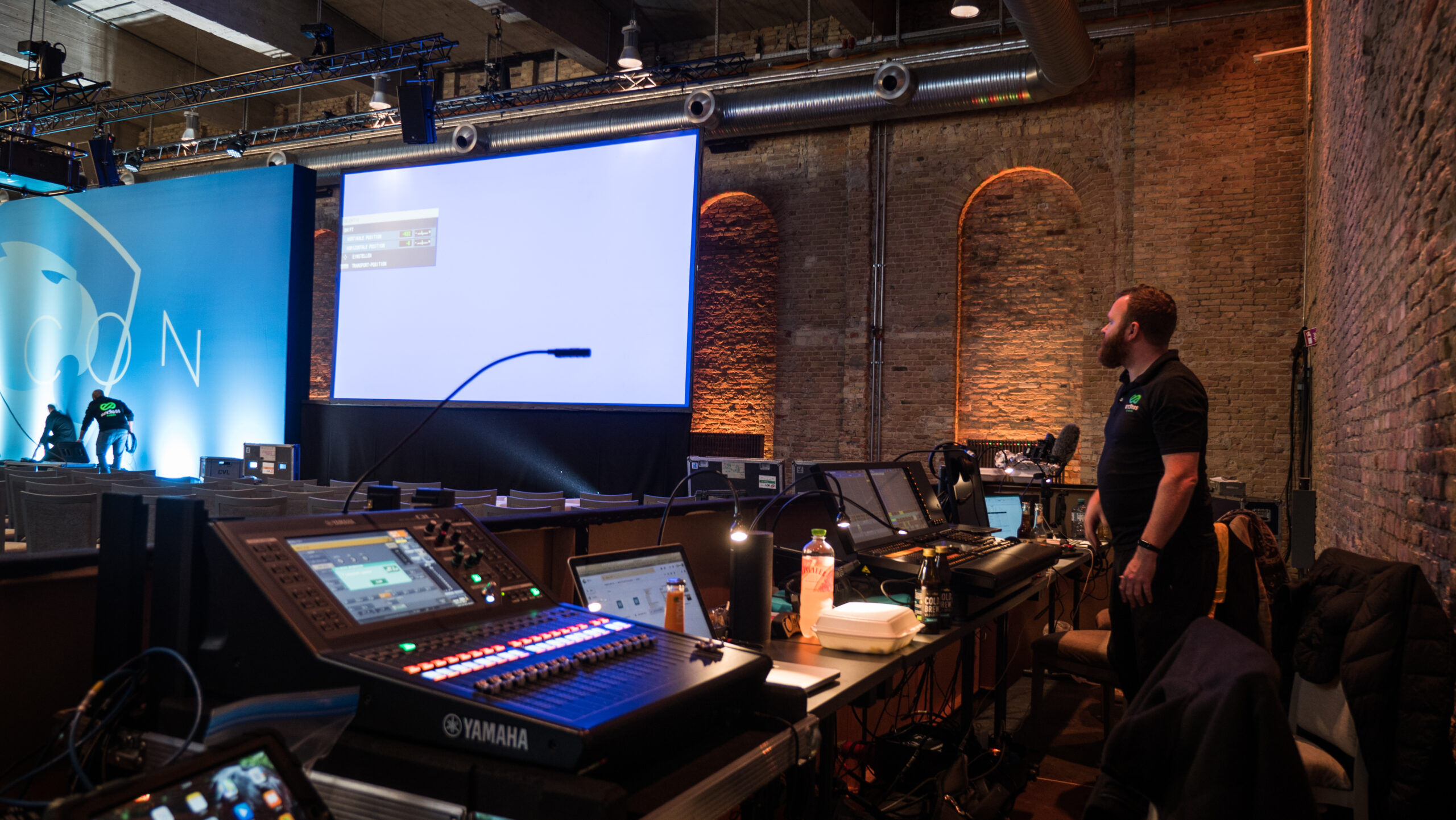Recognizing Event Production: Why It Is Important for Successful Gatherings
Event production plays an important function fit successful celebrations. It includes careful planning, control, and execution to assure every information lines up with the event's vision. This process not just enhances attendee experiences but additionally promotes meaningful connections amongst participants. Understanding the intricacies of event production can significantly influence the overall result. What are the crucial elements that contribute to an effective event, and how can they be effectively managed?
The Duty of Event Production in Producing Unforgettable Experiences
Lots of aspects add to the success of an occasion, event production plays an essential role in crafting unforgettable experiences. This diverse procedure includes different components, including planning, logistics, and implementation. Reliable event production guarantees that every detail straightens with the overall vision, creating a smooth flow that captivates attendees. By collaborating timelines, taking care of resources, and supervising technical elements, event manufacturers establish a foundation for impactful experiences.Moreover, they curate environments that reverberate with the target market, boosting involvement and psychological connection. From picking suitable places to integrating innovative innovation, the selections made throughout production substantially affect just how guests perceive and bear in mind the event. By prioritizing top quality and interest to information, event production changes common gatherings into amazing minutes, leaving long-term impacts. Eventually, the skillful orchestration of these parts specifies the essence of an event, showcasing the value of specialist event production in achieving exceptional results.
Secret Elements of Effective Event Production
Reliable event production depends upon several crucial parts that guarantee success. Planning and coordination develop a solid structure, while technical setup demands deal with logistical demands. In addition, applying target market engagement techniques enhances the overall experience, making the event remarkable.
Preparation and Control
Planning and sychronisation work as the foundation of effective event production, ensuring that every information lines up seamlessly to produce a memorable experience. Reliable planning involves developing a clear vision and goals, while coordination entails the thorough organization of logistics, timetables, and sources. A well-defined timeline is vital, assisting all stakeholders via crucial turning points and tasks. Communication plays an essential duty, promoting collaboration amongst staff member, vendors, and venue team. Normal conferences and updates aid to deal with obstacles promptly, making certain that everyone stays lined up with the event goals. Eventually, a structured approach to preparation and coordination not just enhances performance however additionally greatly adds to the total success and satisfaction of the event for guests and coordinators alike.
Technical Configuration Needs
An effective event depends heavily on its technical arrangement demands, which include essential components such as audio-visual tools, lights, hosting, and connectivity. Audio-visual equipment consists of microphones, speakers, and projectors, making sure that presentations and performances are supplied clearly. Correct illumination improves the ambiance and highlights crucial locations, while presenting provides the required system for speakers and entertainers. Connection, including Wi-Fi and electric accessibility, is important for smooth interaction and innovation assimilation. Each component needs to be diligently prepared and implemented, customized to the event's particular demands. Insufficient technical arrangements can lead to interruptions, negatively influencing the general experience for participants, underscoring the importance of thorough preparation and focus to information in event production.
Audience Interaction Techniques

The Importance of Planning and Control
Preparation and sychronisation are critical to the success of any event production. Effective timeline administration, source allowance approaches, and team interaction characteristics play necessary functions in making sure that all aspects integrated flawlessly. Without an organized method to these aspects, events take the chance of facing delays, budget overruns, and miscommunication amongst team participants.
Efficient Timeline Management


While successful event production usually pivots on imagination and implementation, effective timeline administration remains an important component that can not be ignored. A well-structured timeline acts as the foundation of any type of event, guaranteeing that each stage is implemented in a timely manner. It enables the sychronisation of various tasks, from place arrangement to visitor arrivals, while protecting against prospective traffic jams. By plainly detailing due dates and responsibilities, event planners can maintain emphasis and adapt to unpredicted obstacles. Additionally, a carefully crafted timeline cultivates interaction among staff member, advertising liability and partnership. Ultimately, efficient timeline management not just improves operational effectiveness but also contributes significantly to the total success and smooth implementation of the event, leaving guests with a remarkable experience.
Resource Allotment Strategies
Reliable resource allotment techniques are crucial for the effective implementation of any type of event. Appropriate planning permits event organizers to recognize and disperse resources, such as funds, employees, and materials, in a fashion that optimizes effectiveness. By evaluating the specific needs of each facet of the event, organizers can focus on tasks and allot sources as necessary. Sychronisation among various divisions guarantees that all aspects, from dealing with audiovisual demands, are adequately supported. This tactical strategy not only minimizes waste yet additionally boosts the total experience for guests. In addition, anticipating potential challenges and having backup plans in place permits smoother procedures. Eventually, reliable resource allowance contributes significantly to achieving event objectives and ensuring a remarkable celebration.
Team Communication Dynamics
How can seamless communication amongst employee transform the event production procedure? Effective interaction is essential for working with tasks, sharing updates, and addressing difficulties in real-time. When staff member take part in open dialogue, they can swiftly recognize prospective concerns and develop options collaboratively, minimizing delays and misconceptions. This dynamic fosters a natural setting where everybody understands their functions and responsibilities, bring about a much more synchronized effort. Additionally, regular check-ins and comments loops boost responsibility and assurance placement with the event's objectives. By focusing on communication approaches, groups can improve workflows, bolster morale, and ultimately elevate the general quality of the event. Effective events rest on the capacity to communicate properly, making it a crucial element of event production.
Enhancing Guest Involvement With Imaginative Style
Creative style plays a crucial duty in improving guest interaction at events, as it fosters an immersive environment that captivates participants' focus. By integrating ingenious visuals, interactive aspects, and thematic decor, event coordinators can develop memorable experiences that resonate with participants. Thoughtful design styles promote movement and expedition, motivating guests to interact with displays and each other.Incorporating modern technology, such as increased fact or live ballot, additional enriches the experience, enabling real-time responses and interaction. Furthermore, sensory components like lights, audio, and scent can evoke emotions and create an extra interesting atmosphere.The original site use narration through design aids communicate the event's objective and message, making it extra relatable for guests. Eventually, innovative style not just boosts involvement Bonuses but likewise strengthens links amongst participants, leaving a long lasting perception that prolongs past the event itself. This calculated approach to layout is important for effective gatherings.
Handling Logistics for a Smooth Execution
While the exhilaration of an occasion can draw guests in, managing logistics is vital to protect a seamless implementation. This involves carefully collaborating different components, from location choice and layout to catering and transportation. Efficient logistics monitoring guarantees that all components line up, permitting for a smooth flow from registration to the conclusion of the event.Additionally, a clear interaction plan amongst all stakeholders is necessary. This consists of team, suppliers, and volunteers, who need to be notified of their duties and obligations. Expecting possible difficulties, such as devices failing or unanticipated climate condition, can better boost the event's success.Creating an in-depth timeline aids keep the team on the right track and permits timely adjustments. Ultimately, well-managed logistics not just facilitate an enjoyable experience for participants yet likewise mirror the professionalism and trust and dependability of the organizers, contributing to the total success of the event.

The Effect of Modern Technology on Event Production
What role does innovation play fit modern-day event production? Technology has ended up being a keystone of efficient event production, boosting both preparing and execution procedures. From advanced registration systems to interactive apps, innovation improves participant management and enhances interaction. Online event platforms allow coordinators to reach wider audiences, breaking geographical barriers and facilitating hybrid gatherings that combine in-person and online experiences.Additionally, audiovisual technologies, such as high-def screens and stereos, raise the quality of discussions and efficiencies, making certain a memorable experience for participants - event production charlotte. Social network combination makes it possible for real-time feedback and communication, promoting area engagement in the past, throughout, and after the event. Information analytics devices assist organizers in monitoring participant actions and preferences, allowing tailored experiences that resonate with varied target markets. On the whole, the integration of innovation in event production not just boosts functional effectiveness however also enhances guest experiences, ultimately adding to the success of the event
Evaluating Success: Determining the Outcomes of Your Event
Success in event production rests on effective analysis, which involves gauging a range of outcomes to examine the overall effect of an event. To accomplish this, coordinators can utilize both qualitative and quantitative metrics. Quantitative measures might consist of participation numbers, ticket sales, and earnings generated, while qualitative assessments may involve guest contentment studies and feedback forms.Additionally, analyzing social media interaction and media protection can give understandings into the event's reach and brand influence. Contrasting these metrics against predefined goals helps figure out if the purposes were met.Furthermore, post-event debriefs with the planning group can reveal lessons learned and locations for enhancement. By systematically examining these outcomes, event producers can enhance future gatherings, making certain continuous growth and success. Inevitably, a complete analysis not just highlights success however additionally notifies strategic choices for succeeding events, fostering a culture of quality in event production.
Frequently Asked Inquiries
What Qualifications Should an Event Producer Have?
Event producers should have solid organizational abilities, creativity, and reliable communication capabilities. A background in project monitoring, budgeting, and arrangement is necessary. Relevant qualifications and experience in diverse event types further improve their credentials.
Just How Can I Decrease Event Production Expenses Efficiently?
To properly reduce event production costs, one can streamline vendor choice, work out contracts, use in-house resources, prioritize important aspects, implement modern technology for effectiveness, and check out sponsorship chances to balance out costs without endangering quality.
What Are the Typical Obstacles in Event Production?
Typical obstacles in event production important site consist of budget plan constraints, logistical sychronisation, vendor management, time restrictions, guest involvement, technological problems, and unforeseen conditions - event production charlotte. Each factor can considerably influence the general success and smooth execution of the event
Exactly how Do I Choose the Right Location for My Event?
Choosing the best place involves considering factors such as place, ability, services, and spending plan. Additionally, examining ease of access and atmosphere guarantees the chosen area aligns with the event's objectives and boosts the overall guest experience.
What Is the Regular Timeline for Preparation an Occasion?
The typical timeline for preparing an event varies, but normally consists of stages such as concept development, location choice, supplier coordination, promo, and last preparations, often extending numerous months to assure an effective implementation.